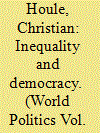|
|
|
Sort Order |
|
|
|
Items / Page
|
|
|
|
|
|
|
| Srl | Item |
| 1 |
ID:
091121


|
|
|
|
|
| Publication |
2009.
|
| Summary/Abstract |
This article enlarges the existing literature on the varieties of capitalism by identifying a third basic variety that does not resemble the liberal market economy or coordinated market economy types. The dependent market economy (DME) type, as it is named by the authors, is characterized by the importance of foreign capital for the socioeconomic setup and is located in postsocialist Central Europe. Since the collapse of state socialism in the late 1980s, the Czech republic, Hungary, poland, and the slovak republic have introduced a rather successful model of capitalism when compared with other postsocialist states. This article identifies the key elements of the DME model and discusses their interplay. DMEs have comparative advantages in the assembly and production of relatively complex and durable consumer goods. These comparative advantages are based on institutional complementarities between skilled, but cheap, labor; the transfer of technological innovations within transnational enterprises; and the provision of capital via foreign direct investment.
|
|
|
|
|
|
|
|
|
|
|
|
|
|
|
|
| 2 |
ID:
091119


|
|
|
|
|
| Publication |
2009.
|
| Summary/Abstract |
Under what conditions do democracies emerge and consolidate? Recent theories suggest that inequality is among the leading determinants of both democratization and consolidation. By contrast, this article argues that inequality harms consolidation but has no net effect on democratization. The author shows that the existing theories that link inequality to democratization suffer from serious limitations: (1) they are useful only for understanding transitions from below and thus do not apply to many other transitions (that is, those from above); (2) even for democratization from below, their predictions are unlikely to hold, since inequality actually has two opposite effects; and (3) they ignore collective action problems, which reduces their explanatory power. However, these objections do not affect the relationship between inequality and consolidation. In particular, while inequality has two opposite effects on the probability of transition to democracy, it unambiguously increases the probability of transition away from democracy. This article conducts the most comprehensive empirical test to date of the relationship between inequality and democracy. It finds no support for the main democratization theories. Contrary to what they predict, estimation suggests neither a monotonic negative nor an inverted U-shaped relationship. Yet inequality increases the probability of backsliding from democracy to dictatorship.
|
|
|
|
|
|
|
|
|
|
|
|
|
|
|
|
| 3 |
ID:
091120


|
|
|
|
|
| Publication |
2009.
|
| Summary/Abstract |
This article examines the political geography of state building in contemporary sub-Saharan Africa. The absence of interstate war has produced a unique situation for contemporary state builders in Africa-they have inherited states with relatively fixed borders encapsulating a variety of environmental and geographic conditions, compounded by varying distributions of population densities. The author examines the effects of a variety of strategies that African rulers have employed to enhance their state-building efforts given the type of national design they inhabit. These strategies include the allocation of citizenship, interventions in land tenure patterns, and the adoption and management of national currencies. The author tests the effects of these strategies on several dimensions of state capacity in sub-Saharan Africa from 1960 to 2004 using a variety of statistical analyses. The results indicate that the strategies currently adopted by african rulers have generally failed to substantially augment their capacity.
|
|
|
|
|
|
|
|
|
|
|
|
|
|
|
|
| 4 |
ID:
091122


|
|
|
|
|
| Publication |
2009.
|
| Summary/Abstract |
A number of influential studies in political science argue that important economic policy changes in the rich democracies since the mid-1970s were caused by the introduction of new economic ideas. This article claims that while experts exert strong influence over the selection of policy instruments, their influence over the formulation of policy objectives is much weaker. In the 1970s, 1980s, and 1990s, the predominance of Keynesianism in Austria and Denmark did not lead Austrian and Danish governments to maintain low unemployment longer than Sweden, where Keynesianism was less strong. But it did lead them to regard fiscal policy as an instrument that can be used to control the level of activity in the economy, while their Swedish counterparts relied instead on exchange rate and monetary policy.
|
|
|
|
|
|
|
|
|
|
|
|
|
|
|
|
|
|
|
|
|